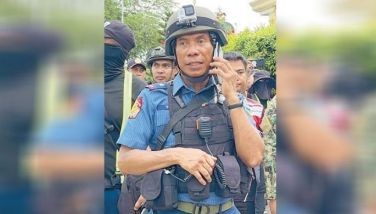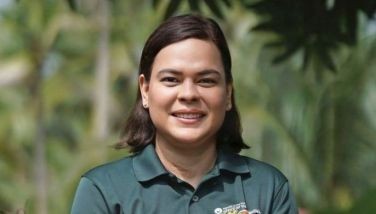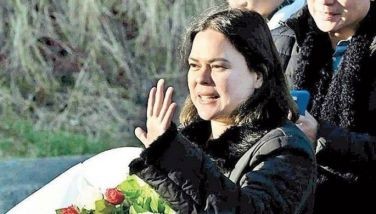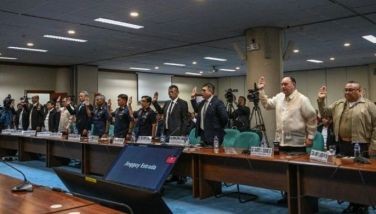‘Derailed’

April 3, 2006 | 12:00am
Yes, the rumors are true that, indeed, Finance Secretary Margarito Teves is going to the World Bank (WB) in Washington D.C. early this month. This is because Teves will chair the WB’s G-24 annual meeting scheduled this April 19. But before he flies to the US, Teves and the other key members of President Arroyo’s economic team will embark on yet another Philippine Bond roadshow that will take them to London this week.
Coffee shop brew originally had it that Teves was supposed to leave the Arroyo Cabinet for a new post waiting for him at the WB. But even rumors can be confusing. Teves himself had a good laugh when I asked him about his rumored exit from the Cabinet to take a supposed high-paying job at the WB. Actually he is going to the WB-run G-24 which is the Inter-governmental Group of Twenty-Four on International Monetary Affairs and Development (G-24). The G-24, established in 1971, is that international body that takes up the cause of developing countries on monetary and development finance issues. It consists of countries from each of three regional groups, namely, Africa, Latin America and the Caribbean, and Asia.
The G-24 member countries from Africa include Algeria, Côte d’Ivoire, Egypt, Ethiopia, Gabon, Ghana, Nigeria, South Africa and the Democratic Republic of Congo. The Latin America and the Caribbean G-24 members are Argentina, Brazil, Colombia, Guatemala, Mexico, Peru, Trinidad and Tobago and Venezuela. For Asia and developing countries of Europe, the G-24 is composed of India, Iran, Lebanon, Pakistan, the Philippines, Sri Lanka, and the Syrian Arab Republic.
Under the G-24 set up, there are three office-bearer countries, namely, the Chair, the First, and the Second Vice Chair, representing the three regions and constituting the G-24 Bureau. An elected country takes up the Second Vice Chair for the first 12-month period, becomes First Vice Chair the following year and assumes the Chair the year thereafter. The Philippines was elected three years ago to the G-24 Bureau. Hence, it is now the turn of the Philippines under this G-24 system. This is why Teves assumes the chairmanship in this year’s meeting of the G-24. His First Vice Chair is Mrs. Felisa Miceli, the Minister of Economy of Argentina, and the Second Vice-Chair is Marco Banguli, the Minister of Finance of Congo. Decision-making within the G-24 is by consensus. As the Chair country representative,Teves takes responsibility for preparing the meetings and running the press conference of the G-24 at the end of their meeting, together with the two Vice-Chairs.
Teves, along with Trade and Industry Secretary Peter Favila and Economic Planning Secretary Romulo Neri are the featured guests in tomorrow’s Manila Overseas Press Club (MOPC) dinner program dubbed "Investments Outlook" at the Grand Ballroom of the Inter-Continental Hotel in Makati city. The economic team will fly later this week to London to launch the newest RP bond in an international road show. Teves will return to Manila before he goes to Washington for the G-24 meeting.
Speaking of Favila and Neri, the two Cabinet officials are also reportedly set to fly to Beijing to sign a Memorandum of Understanding (MOU) with their counterpart Chinese government officials for a new loan facility offered to the Philippines at highly concessional terms. Li Jinjun, ambassador of The People’s Republic of China to the Philippines, met with President Arroyo last March 22 at Malacañang Palace and discussed with her the offered loan facility together with Speaker Jose de Venecia.
As I gathered, the Philippines can avail of $1 to $5 billion of the initial loan package that could go as high as $10 billion. It will carry a 20-year repayment period, with a ten-year grace period at three percent interest. Of this amount, $1 billion is supposedly being lined up as financing for the section of the South Rail project from Calamba to Legazpi City and possibly all the way to Sorsogon. The South Rail project from Tutuban to Calamba is financed by official development assistance (ODA) from South Korea. Like any other ODA facility, the offered new financing support from China is another "tied" loan – the project will have be undertaken tapping Chinese engineering firms and consultants and equipment must be imported from China.
My Palace source told me President Arroyo was excited about this project and purportedly told the Chinese envoy that she will dispatch her economic managers to sign the MOU in Beijing. Favila and Neri, who are closely identified with De Venecia, will be joined in Beijing reportedly by Congressman Luis Villafuerte (Lakas, Camarines Sur) whose province is the direct beneficiary of this South Rail project. Favila used to work as consultant of De Venecia when they worked out with the Chinese government the loan facility for the controversial North Rail project. So more or less, Favila has enough experience and ideas on how to go about this new Chinese loan facility. Hopefully, this proposed Chinese financing for the South Rail project does not suffer the same scandal as the North Rail project.
Allegations of "over-pricing" and other supposed anomalies nearly derailed the North Rail project. Todate, however, the North Rail project has moved forward quite a lot since no less than Vice President Noli de Castro took charge of the politically troublesome problem of removing the squatters along the rail tracks and relocating the affected families elsewhere, mostly to government resettlement sites in Bulacan. The Vice President has invested his own political capital to undertake what could make him unpopular to the urban poor groups for implementing this squatter relocation program.
If it is any source of optimism, the undistracted focus of Arroyo officials on these development programs and projects of the government gives us hope that things can get better even while our political pot continues to boil over the Charter change (Cha-cha) brouhaha.
At least, Speaker De Venecia is consistent with his fixation to improve the country’s train services as a means to bring growth and development to the countryside. But bitter critics of President Arroyo and De Venecia have also branded their Cha-cha initiatives as a runaway "railroad" to achieve the goal of installing a new parliamentary-federal system of government in the country. In fact, De Venecia sees this Cha-cha process completed by July next year. The opponents of Cha-cha in Congress can only wish for some sort of force majeure to derail the De Venecia Express.
Write to marichu@philstar.net.ph
Coffee shop brew originally had it that Teves was supposed to leave the Arroyo Cabinet for a new post waiting for him at the WB. But even rumors can be confusing. Teves himself had a good laugh when I asked him about his rumored exit from the Cabinet to take a supposed high-paying job at the WB. Actually he is going to the WB-run G-24 which is the Inter-governmental Group of Twenty-Four on International Monetary Affairs and Development (G-24). The G-24, established in 1971, is that international body that takes up the cause of developing countries on monetary and development finance issues. It consists of countries from each of three regional groups, namely, Africa, Latin America and the Caribbean, and Asia.
The G-24 member countries from Africa include Algeria, Côte d’Ivoire, Egypt, Ethiopia, Gabon, Ghana, Nigeria, South Africa and the Democratic Republic of Congo. The Latin America and the Caribbean G-24 members are Argentina, Brazil, Colombia, Guatemala, Mexico, Peru, Trinidad and Tobago and Venezuela. For Asia and developing countries of Europe, the G-24 is composed of India, Iran, Lebanon, Pakistan, the Philippines, Sri Lanka, and the Syrian Arab Republic.
Under the G-24 set up, there are three office-bearer countries, namely, the Chair, the First, and the Second Vice Chair, representing the three regions and constituting the G-24 Bureau. An elected country takes up the Second Vice Chair for the first 12-month period, becomes First Vice Chair the following year and assumes the Chair the year thereafter. The Philippines was elected three years ago to the G-24 Bureau. Hence, it is now the turn of the Philippines under this G-24 system. This is why Teves assumes the chairmanship in this year’s meeting of the G-24. His First Vice Chair is Mrs. Felisa Miceli, the Minister of Economy of Argentina, and the Second Vice-Chair is Marco Banguli, the Minister of Finance of Congo. Decision-making within the G-24 is by consensus. As the Chair country representative,Teves takes responsibility for preparing the meetings and running the press conference of the G-24 at the end of their meeting, together with the two Vice-Chairs.
Teves, along with Trade and Industry Secretary Peter Favila and Economic Planning Secretary Romulo Neri are the featured guests in tomorrow’s Manila Overseas Press Club (MOPC) dinner program dubbed "Investments Outlook" at the Grand Ballroom of the Inter-Continental Hotel in Makati city. The economic team will fly later this week to London to launch the newest RP bond in an international road show. Teves will return to Manila before he goes to Washington for the G-24 meeting.
Speaking of Favila and Neri, the two Cabinet officials are also reportedly set to fly to Beijing to sign a Memorandum of Understanding (MOU) with their counterpart Chinese government officials for a new loan facility offered to the Philippines at highly concessional terms. Li Jinjun, ambassador of The People’s Republic of China to the Philippines, met with President Arroyo last March 22 at Malacañang Palace and discussed with her the offered loan facility together with Speaker Jose de Venecia.
As I gathered, the Philippines can avail of $1 to $5 billion of the initial loan package that could go as high as $10 billion. It will carry a 20-year repayment period, with a ten-year grace period at three percent interest. Of this amount, $1 billion is supposedly being lined up as financing for the section of the South Rail project from Calamba to Legazpi City and possibly all the way to Sorsogon. The South Rail project from Tutuban to Calamba is financed by official development assistance (ODA) from South Korea. Like any other ODA facility, the offered new financing support from China is another "tied" loan – the project will have be undertaken tapping Chinese engineering firms and consultants and equipment must be imported from China.
My Palace source told me President Arroyo was excited about this project and purportedly told the Chinese envoy that she will dispatch her economic managers to sign the MOU in Beijing. Favila and Neri, who are closely identified with De Venecia, will be joined in Beijing reportedly by Congressman Luis Villafuerte (Lakas, Camarines Sur) whose province is the direct beneficiary of this South Rail project. Favila used to work as consultant of De Venecia when they worked out with the Chinese government the loan facility for the controversial North Rail project. So more or less, Favila has enough experience and ideas on how to go about this new Chinese loan facility. Hopefully, this proposed Chinese financing for the South Rail project does not suffer the same scandal as the North Rail project.
Allegations of "over-pricing" and other supposed anomalies nearly derailed the North Rail project. Todate, however, the North Rail project has moved forward quite a lot since no less than Vice President Noli de Castro took charge of the politically troublesome problem of removing the squatters along the rail tracks and relocating the affected families elsewhere, mostly to government resettlement sites in Bulacan. The Vice President has invested his own political capital to undertake what could make him unpopular to the urban poor groups for implementing this squatter relocation program.
If it is any source of optimism, the undistracted focus of Arroyo officials on these development programs and projects of the government gives us hope that things can get better even while our political pot continues to boil over the Charter change (Cha-cha) brouhaha.
At least, Speaker De Venecia is consistent with his fixation to improve the country’s train services as a means to bring growth and development to the countryside. But bitter critics of President Arroyo and De Venecia have also branded their Cha-cha initiatives as a runaway "railroad" to achieve the goal of installing a new parliamentary-federal system of government in the country. In fact, De Venecia sees this Cha-cha process completed by July next year. The opponents of Cha-cha in Congress can only wish for some sort of force majeure to derail the De Venecia Express.
BrandSpace Articles
<
>
- Latest
- Trending
Trending
Latest
Trending
Latest
Recommended

May 29, 2025 - 7:50pm


























